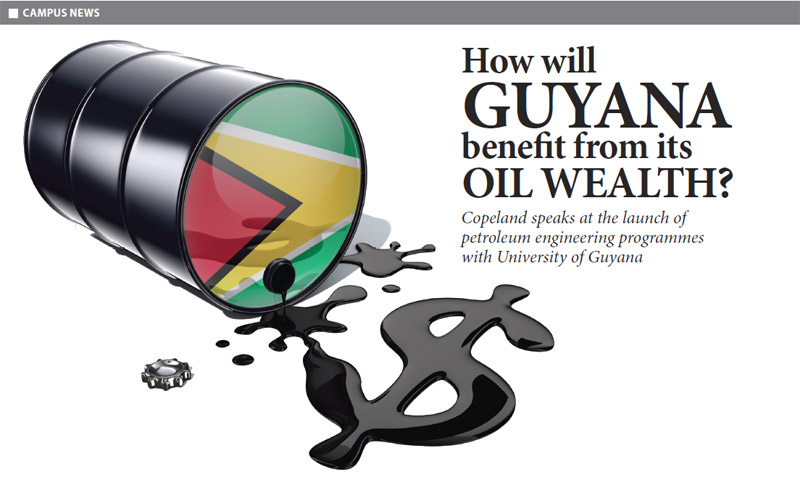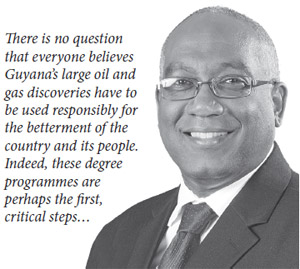
As far back as the year 2000 the United States Geological Survey (USGS), an agency of the US Government, reported on the enormous potential of Guyana as a source of offshore oil in South America. In the years since the reporting (and drilling) has only strengthened that conclusion.
“Three discoveries in the 6.6 million acre Staebroek Block have made Guyana one of the world’s three most promising deepwater plays,” an article from World Oil magazine said in 2017. Guyana, it said, had the promise of “an oil revenue boom by 2020”.
But with an economy dependent on agriculture and extractive industries, and very little experience as an energy producer, how is Guyana to develop the oil industry know-how and manpower to realise that potential? They have a very helpful neighbor.
On January 25 2019, The University of the West Indies (UWI), the University of Trinidad and Tobago (UTT) and the University of Guyana (UG) formally launched new undergraduate and post-graduate programmes in petroleum engineering at the UG. The programmes will train a new generation of petroleum engineers to lead Guyana’s emerging energy industry.
At the launch symposium hosted by UG’s Turkeyen Campus in Georgetown, Vice-Chancellor Professor Ivelaw Griffith said the programmes were developed through partnerships with The UWI and UTT over a period of 15 months. The Associate of Science Degree in Petroleum Engineering will be offered by UG in collaboration with UTT. The Master of Science in petroleum Engineering will be offered by The UWI in partnership with UG.
UWI St Augustine Campus Principal Professor Brian Copeland, led The UWI team to Guyana. He gave the keynote address at the launch symposium. UWI Today is pleased to share his full address here. Below is an extract from the same speech.
 On behalf of The University of the West Indies, I am pleased to bring greetings and congratulations to the University of Guyana on the occasion of this Launch Symposium for its Associate and Master’s Degrees in Petroleum Engineering. On behalf of The University of the West Indies, I am pleased to bring greetings and congratulations to the University of Guyana on the occasion of this Launch Symposium for its Associate and Master’s Degrees in Petroleum Engineering.
The establishment of an Associate Degree in Petroleum, in partnership with the University of Trinidad and Tobago, and the Master’s Degree in Petroleum Engineering, to be delivered by The University of the West Indies in Guyana and in Trinidad and Tobago, is an important example of how focus, commitment and co-operation can have positive outcomes.
Robin M Mills, CEO of Qamar Energy, and author of The Myth of the Oil Crisis, wrote a piece last October for The National Business, a publication in the United Arab Emirates. His headline was unequivocal: "Guyana”, he said, “may be the next big beast in global oil".
He made the point that, by the 2020s, Guyana could well be sharing output of 700,000 barrels per day among just 770,000 people, producing a medium-light crude which is closer to major Middle East grades – unlike the mostly very light shale oil found in the United States.
In his article, Mills claimed:
If the discoveries are significant for the world, they will be transformational for Guyana. Gross oil revenues of some United States Dollars 13 billion annually by the mid-2020s, or about $17,000 per inhabitant, (in) contrast to its 2016 GDP of just $3.4bn. Only some 14 per cent of this will come to the government for the first two to three years while costs are paid off, but this is still an enormous bonanza.
The article goes on to identify the pitfalls that await, the fears and the challenges that already exist, not the least of which is the challenge of coping with the speed of the upcoming wealth surge. As Matt Blomerth, head of Latin American Upstream Research for the consultancy firm Wood McKenzie, said in a January 2017 New York Times article, “it’s not often that a country goes from 0 to 60 as fast like this”. As most of us know, this can be exhilarating and frightening at the same time.
Allow me to posit this to you – as South America’s newest oil producer, petroleum can bring untold wealth. But what happens beyond that? What happens beyond the petroleum boom? How will the people of Guyana benefit from this yet untapped wealth? What will Guyana look like in the next few years?
Answers to these and other related questions can perhaps be obtained by drawing from the examples of others. Mills ended his article with these guiding words: “Guyanese are fortunate to have contrasting examples next door in Venezuela of how a mismanaged oil sector can ruin a country; and Trinidad (and Tobago), where petroleum has generally been positive for the country”.
There is no question that everyone believes Guyana’s large oil and gas discoveries have to be used responsibly for the betterment of the country and its people. Indeed, these degree programmes are perhaps the first, critical steps which would equip and encourage graduates to take responsibility, to use their knowledge and expertise to ensure there is accountability in the extraction process and that Guyana would, in the first instance, get its fair share from the monetisation of this natural resource. Even better, it sets the stage for Guyana to take greater command of its oil and gas sectors in the not too distant future. |





